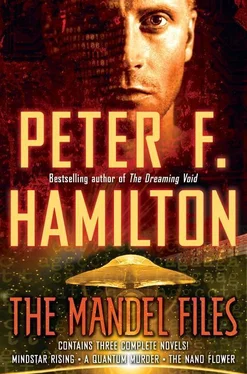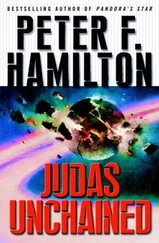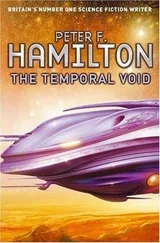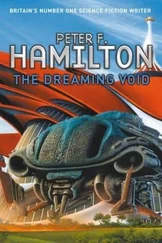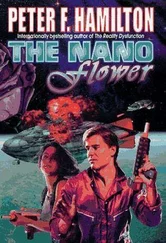Suzi’s armour suit split open down the side of the torso, and she began to wriggle her legs out. Her tracksuit fabric was heavily creased where the suit’s spongy internal lining had contracted about her.
Alex Lahey began to unplug the fibre-optic cables. “Your knee shouldn’t be a problem,” he said as Suzi emerged. “The suit will support it.”
“Great.” She dropped lightly on to the floor, and promptly flexed her leg, rubbing at the bioware sheath.
“Could you thumbprint this, please?” He proffered a cybofax. “It’s the release authorization for the suit.”
Greg looked at the bare concrete of the ceiling, offering up a small prayer.
“You betcha.”
Suzi was smiling acid sweet as she pressed her thumb against the cybofax’s sensitive pad. She eyed the weapons rack. “I’d like one of those Honeywell pulsed plasma carbines; a Konica rip gun, plus eight power magazine cells; five Loral fifteen-centimetre pattern-homing missiles, programmable from my implant; and ten directed lance charges with timed and remote detonators. And have you recharged my Browning?”
Alex Lahey sagged in place, his watery eyes giving Suzi a disbelieving stare.
“What’s up? Do you need another thumbprint?”
“Whatever the lady wants, Alex,” Melvyn Ambler said in a pained tone. “Put it all in with the rest of our gear.”
“You’re a gent,” Suzi grinned.
Greg turned round to see the crash team captain standing behind him.
“The spaceplane will be here in five minutes,” Melvyn said. “We’ll load our gear and launch straight away.” He held up two maroon flight bags. “I’ve got your shipsuits. Put your clothes in the bag, you can wear them again in New London. Do either of you need an anti-nausea infusion for the flight?”
“Not me,” Greg said. “I’ve been in freefall before. Didn’t suffer then.”
“I’ll take one,” Suzi said brightly.
“Right.” Melvyn Ambler hesitated. “Are we likely to meet a hazard up there?”
“I’ll give you a full briefing on the spaceplane,” Greg said. But you’re along mainly for your deterrence value.”
“Thank you. Mr Tyo said you are in complete control of the operation.”
“He’s got to be flicking kidding,” Suzi muttered.
Spaceplane shipsuits seemed to have improved. The last time Greg had gone into orbit the rubber garment they gave him looked like it was sprayed on. You needed to be a mesormorph to wear one with any dignity. This time Melvyn had provided him with a comfortable, fairly loose, ginger-coloured onepiece with elasticated wrist and ankle bands; the wide pinnedback lapels taken straight off the kind of jacket a nineteenthirties flying ace would’ve worn. A multifunction ‘ware wafer was clipped into its pocket on his upper right arm, monitoring his physiologicaI functions, along with the atmospheric pressure, temperature, gas composition, and radiation levels.
He carried his maroon flight bag out to Anastasia, the Orion-class spaceplane that had landed in the centre of the generator platform. The twenty-strong crash team were trooping into the airlock in front of him, all of them in the same ginger one-piece, a cyborg army. Charlotte and Fabian walked behind, talking in low tones.
Anastasia was a simple delta shape, twenty-six metres long, built around a pair of induction rams; convergent tubes which compressed incoming air, heated it with a battery of radio-frequency induction coils, and blasted it out through expansion nozzles. A simple, clean propulsion system which took over from the fans at Mach seven and boosted the spaceplane up to orbital velocity. There was also an auxiliary reaction drive fitted which made her capable of lifting twenty-five tonnes of payload direct to New London. Her pearly lofriction fuselage glinted bright and cool under the mid-morning sun. Big scarlet dragon escutcheons were painted on the fin.
A convoy of five small drone lorries had drawn up underneath, and the crash team’s armourers were loading pods of equipment into the rear cargo bay through hatches in the tail cone.
Greg ordered a small neurohormone secretion as he waited at the foot of the airstair. His intuition didn’t say much about anything, a grudging sense of inevitability was the best it could manage. He always thought of the ability as being slightly timeloose, a weak form of precognition. That ought to mean death should ring out loud and clear.
“Anything?” Suzi asked. She knew how he relied on it.
“No. Not a thing.” He turned to Charlotte and Fabian. The ginger shipsuit looked stunning on the girl. “Time to go,” he told her.
She bent down and gave Fabian a long, lingering kiss.
Greg shifted uncomfortably; Suzi chortled and started up the airstairs, swinging her flight bag jauntily.
Charlotte eventually broke off the embrace. “This won’t take long,” she murmured in a voice so quiet Greg could barely make out the words. She and Fabian looked as if they were being parted for eternity. Fabian flipped some hair out of his eyes. “Come back to me,” he pleaded mournfully.
“You know I will.” Charlotte planted a final kiss on his brow, and went up the stairs in a hurry. Greg tugged his cap on, a close-fitting padded dome that came down over his ears, protection against hard corners when he was in freefall. He followed Charlotte up the stairs; when he looked back Fabian was sprinting for the crew quarters, a hardline bodyguard in pursuit.
Anastasia seated forty passengers in her cabin. It was compact, but not cramped. The walls were covered in a quilt of grey padding, even the deck was slightly springy as Greg walked down the aisle. A biolum strip ran along the centre of the ceiling, fabric hoops banging on either side, reminding him of the handholds for standing passengers on a bus. At the rear of the cabin was a galley and a couple of toilet cubicles. He eyed them warily, a series of unwelcome memories surfacing, painfully tight tubes and suction holes that pinched. Best to wait until New London.
There was no separate cockpit. The pilot sat behind the narrow curving windscreen, dressed in the same kind of ship-suit as Greg, except his was silvery grey. He didn’t even have a flight console, no controls of any kind. Sitting with arms neatly folded across his lap, eyes half-closed in some zen-like contemplation. Multicoloured geometric spiderwebs rolled across the windscreen itself. Greg guessed the pilot must use a processor node to interface with the spaceplane’s flight ‘ware.
He didn’t enjoy the idea. When he was in the army he used to fly parafoils and microlites; direct physical control, you shifted your weight and the wing banked in response. It was something you could feel, solid and dependable. Real flying.
Surely the spaceplane must have some kind of manual fallback? The pilot would probably laugh if he asked. He looked young, mid-twenties; a generation that wasn’t so much ‘ware literate as ‘ware addicted.
The crash team were choosing their seats noisily, like a small-town rugby club on their way to a match, all jokes and laughs. Two stewards helped to stow their flight bags in the lockers under the seats.
Suzi was sitting in one of the seats behind the pilot. Greg claimed the one next to her, where he could see out of the graphic-etched windscreen. He touched the activation stud on his armrest, and the seat cushioning slid round his legs, gripping gently.
Charlotte and Melvyn Ambler were sitting across the aisle from them, Rick in the row behind. The security captain leaned forward. “That’s everyone,” he told the pilot.
“OK. Flight time will be about three and a half hours, we should rendezvous with New London somewhere over South America.” The airlock hatch closed, cutting off the thrum of the platform’s thermal generators.
Читать дальше
